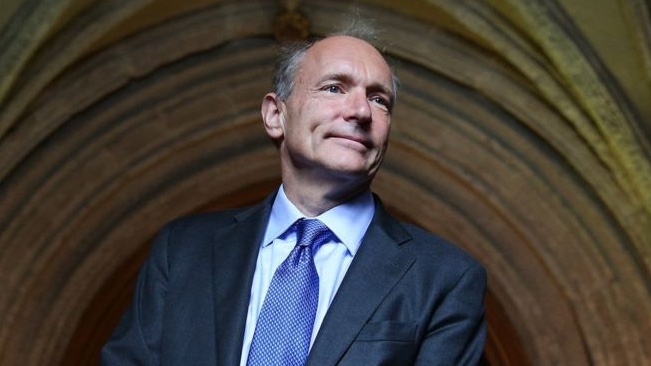Sir Tim Berners-Lee has hit out at the US government and FCC following the decision to repeal ISP privacy rules which were put in place to provide some level of control for the consumer.
April 5, 2017

Sir Tim Berners-Lee has hit out at the US government and FCC following the decision to repeal ISP privacy rules which were put in place to provide some level of control for the consumer.
On the same day Berners-Lee received the Turing Award, known as the Nobel Prize of the computing world, the father of the internet shamed plans in the ‘Land of the Free’ to sell users personal information without permission from said user.
“When the internet was new, when people didn’t realize to what extent it would be important to people’s lives, I gave talks pointing out that, actually, when people use the web what they do is really, really intimate,” said Berners-Lee in an interview with the Guardian.
“They go to their doctor for a second opinion; they’ve gone to the web for the first opinion on whether it’s cancer. They communicate very intimately with family members that they love. There are things that people do on the web that reveal absolutely everything, more about them than they know themselves sometimes.”
Admittedly the loss of certain privacy privileges in the pursuit of safety is a well-accepted practise in such turbulent times, however the ease in which the US government has rid the American citizen of any sense of privacy is truly remarkable. There has been opposition, but this opposition seems to be nothing more than a minor speed bump, as the US moves closer and closer to the totalitarian societies which are so evilly portrayed in Hollywood.
In the search of safety and the protection of the American way of life, there seems to be no consideration to the contradiction in its actions. The bigger pictures seems too much for President Trump and his Republican party to consider, though considering the short-term nature of American politics and the partisan approach in the two electoral parties, this should hardly be a surprise.
While the Republican party appears to have a complete disregard for the basic principles of privacy in the pursuit of ‘democracy’, it seems this view is not shared by the entirety of the American population. Aside from protect groups appearing on sites such as GoFundMe, threatening to purchase the browsing data of legislators responsible for the repeal, NordVPN has also noticed a couple of trends hinting at the concern.
In the days following President Trump’s signature on the document which would repeal FCC Internet privacy rules that would have stopped intrusive practices of ISPs, NordVPN has noticed a 200% spike in user inquiries from the US, as to what the rules actually mean and how they can protect themselves. The NordVPN also believe the move would weaken standard web encryption techniques which many internet browsers unknowingly rely on.
Prior to the repeal, ISPs would only track unencrypted internet traffic. While many recommend a VPN, many rely on web page encryption offered by HTTPS protocol, which is secured with SSL (Secure Socket Layer), preventing ISPs from building an advertising profile on the user. The new rules would allow ISPs to intercept encrypted HTTPS web-page data, decode it, process it, re-encrypt it, and then finally pass the re-encrypted data along to its original destination. NordVPN believes this would ultimately weaken security of the entire web.
Although the US is grabbing the headlines by violating personal privacy, it would be unfair to place all the blame on our transatlantic compatriots. Most Western governments are making worrying statements which could expose citizens.
In the UK, Home Secretary Amber Rudd has accused WhatsApp of offering a place for terrorists to hide. Rudd has also made several comments which seem to be setting into motion a movement towards the removal or limitation of encryption on such OTT services.
Telecoms.com appreciates intelligence agencies need assistance from the technology sector in the battle against terrorism, but where should the line be drawn? An open communications sector with little or no encryption would certainly expose the activities of terrorists, but it would also leave every citizen open to embarrassment, blackmail and fraud. By tackling criminal intentions in one context, the population would be left wide open to attack from another.
It certainly is a thankless task, but the removal of end-to-end encryption is not the answer, and neither is the introduction of a backdoor for intelligence agencies to access this information. Firstly, who polices this gateway and what counts as an acceptable invasion of privacy? And secondly, if there is a backdoor for the intelligence agencies, you can almost certainly guarantee there is someone from the criminal society who is smart enough to take advantage of this weakened section of the perimeter.
In the American case, the drivers are commercial, while there are other arguments raging on about security at the same time. However, the ease in which personal privacy can be dismissed and erased is becoming far too commonplace around the world, but the blame cannot solely be placed in the laps of politicians or business executives.
In the connected era, it has become standard practise to showcase one’s life on a variety of open social media platforms, taking little consideration to who might be on the other side of the screen. Perhaps one question should be answered before questioning how much privacy we want or require: have we forgotten what privacy actually means?
About the Author(s)
You May Also Like








.png?width=300&auto=webp&quality=80&disable=upscale)


_1.jpg?width=300&auto=webp&quality=80&disable=upscale)


.png?width=800&auto=webp&quality=80&disable=upscale)